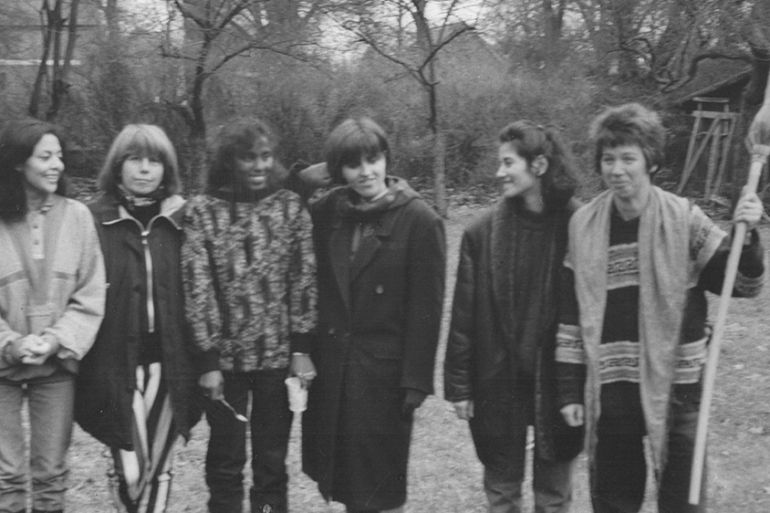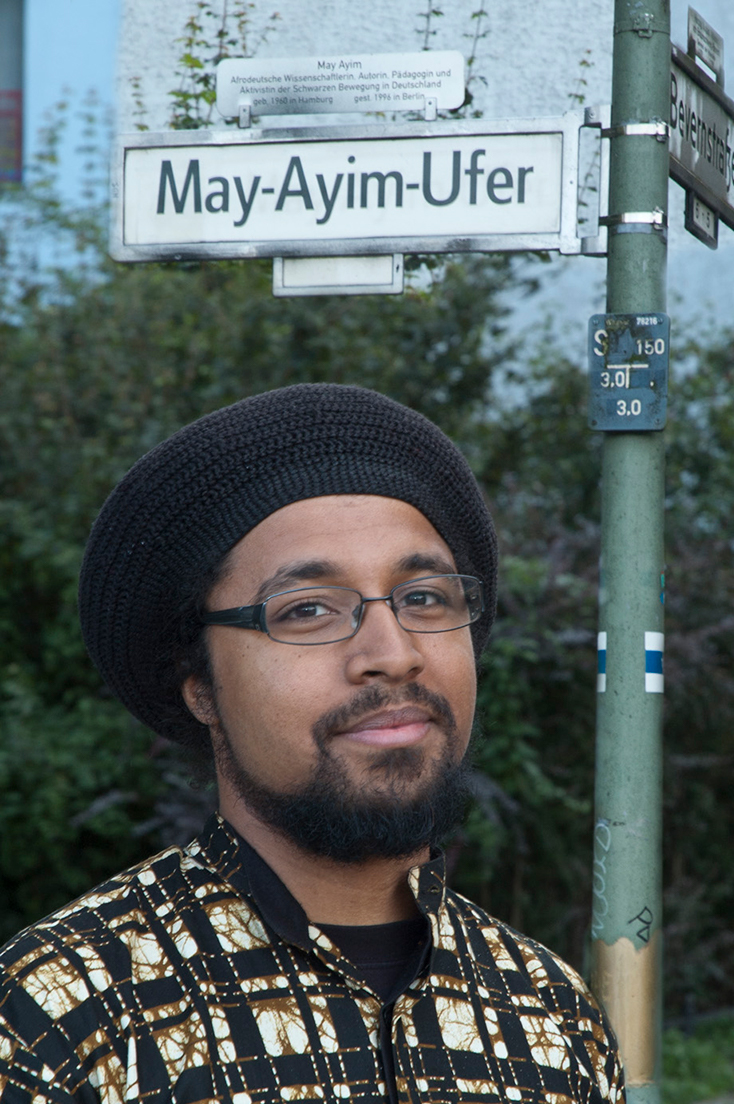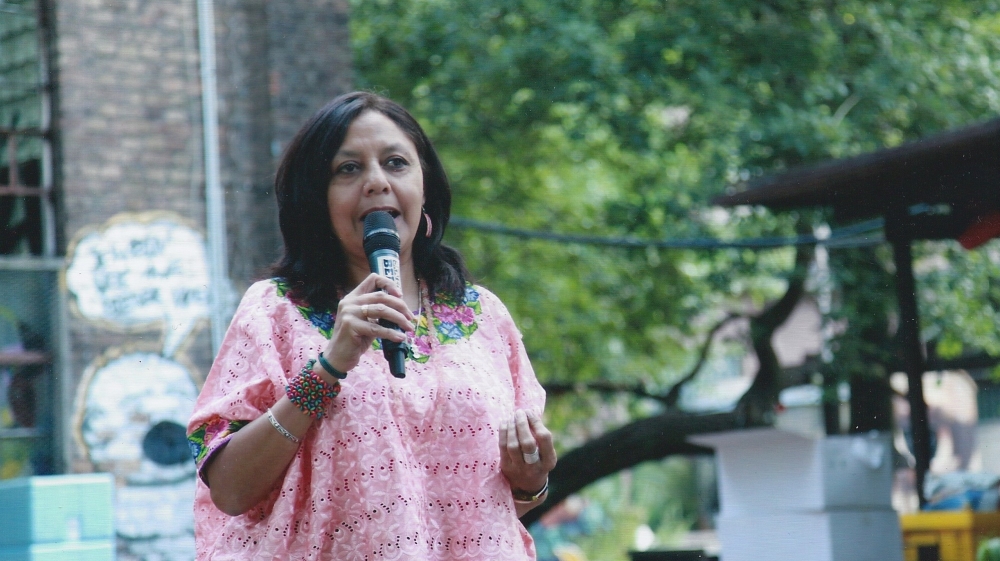How did the fall of the Berlin Wall impact Germans of colour?
Non-white Germans say their euphoria over unification was short lived as racist dynamic unfolded after historic event.

Berlin, Germany – Joshua Kwesi Aikins was nine when the Berlin Wall came down on November 9, 1989.
Living in a housing block in the north of the city a few hundred metres away, he was excited as the physical structure started to crumble.
Keep reading
list of 4 itemsRwanda genocide: ‘Frozen faces still haunt’ photojournalist, 30 years on
Underground tunnels found in Israel from Jewish revolt against Romans
Lost in Orientalism: Arab Christians and the war in Gaza
“I knew it was Germany on the other side, but it looked different, had a different system and people who tried to come over were prevented from doing so. There was this feeling of – it is good that this ends,” he told Al Jazeera.
In the years that followed, many Germans across the country embraced the new-found freedoms and family reunions.
The fall came as protests calling for reform across the communist bloc eventually arrived in East Germany, adding pressure on authorities to act.
On November 9, 1989, a spokesman for East Berlin’s Communist Party announced that from midnight, GDR citizens would be free to cross the border. His surprise announcement led to thousands of East Germans flocking to the Wall and guards were forced to open barriers.
It marked the beginning of the end for the physical structure that had divided the city from 1961. The fall of the wall, which had come to symbolise the Cold War, led to the reunification of Germany and heralded a new chapter in European history.
But for Aikins, a German Ghanaian, and other people of colour living in the country, the reality of reunification was different.
“The patriotism that followed reunification centred around Germany being one again, but unfortunately, what surfaced soon after that was a seriously racist dynamic,” Aikins said.
“There was a surge in far-right youth movements and activism, which led to an increase in outwardly and aggressively racist violence. Slogans like ‘Wir sind ein Volk’ (We are one people) and ‘Wir sind das Volk’ (we are the people’) which had been used in the peaceful revolution and reunification movement were now appropriated by the far right.
“Nazi ideas of the German Volk as a project of homogeneity and superiority were evoked. Such talk was laced with threats of racist violence.
“We were witnessing this and I began to question what this meant for the country I was born in.”
At some point during reunification, Germany stopped addressing its Nazi past and following generations have continued to perpetuate the racist and colonialist ideology of the white 'Ubermensch' as the dominant race.
Some of the worst cases of far-right violence included the 1992 xenophobic riots in Rostock-Lichtenhagen, where thousands threw molotov cocktails at an asylum seeker’s home amid racist chants while locals applauded.
That followed two arson attacks on Turkish homes – first in Molln in 1992 and a year later in Solingen – in which eight people lost their lives and many more were injured.
‘I used to be beaten up every morning’
Mai Thu Bui’s parents were among thousands of Vietnamese who came to the GDR after the Vietnam war.
As contract workers, they were not afforded the same rights as German citizens.
“My parents told me there was a contractual clause that prevented workers from having children,” she told Al Jazeera.
“So abortions among Vietnamese women became normalised.”

After reunification, her father – a translator, and her factory worker mother – chose to stay in Germany unemployed, rather than returning to Vietnam with a three-month wage packet.
Bui, 28, said her early years in Plauen, a city near the Bavarian border in former East Germany, were tainted by racist violence.
“I used to be beaten up every morning during first grade and was called racial slurs like ‘slit eyes’,” she said.
“There was an ongoing threat of neo-Nazis and every-day racism. After reunification, a doctor in the West said to my father, ‘Why did you leave East Germany and come here?’ It was these kinds of experiences that made him more shy and pushed him to retreat from society.”
I had to learn how to read far-right visual codes, like shoelaces, or a certain brand to know if I was at risk.
Lucia Muriel can relate to this feeling of exclusion.
In 1963, when she was seven, she moved to the GDR from Ecuador. Her mother, who was involved in left-wing politics, was one of many Latin Americans who found in the GDR a place of solidarity and acceptance.
But Muriel’s daily life in Leipzig, a city around 150km from Berlin, didn’t always live up to the GDR’s self-defined anti-fascist image.
“People would often stop me and say, ‘Why don’t you wash yourself? Look at your skin, it’s so filthy.’ Sometimes they would throw stones or rubbish at me, it was very violent,” she said.
She went to study in West Germany in 1976. Racism and a new sense of exclusion grew after 1989.
“We were made to feel invisible and many people lost their jobs. Nobody was interested in the social or financial problems we were facing and there was no psychological support.”
Muriel – by then a mother-of-two – returned to Ecuador five years later.
Impact of reunification racism
Within a few years, the extreme racist violence that had characterised the early post-wall years subsided. But for Aikins and Bui, the mental and physical impact left a mark.
Aikins, a political scientist and human rights activist, said: “The violence died down but once you have seen that kind of violence it never goes back to this notion of innocence, because now there is this looming threat. People I knew, including my dad, were chased in the street. I felt claustrophobic.
“I had to learn how to read far right visual codes like shoe laces, or a certain brand to know if I was at risk. We experienced the consequences of far-right strategies such as the creation of so-called Nationally Liberated Zones – deprived areas the far right would go into and help people out with things like shopping, while also spreading their racist ideas.
“I had to create a mental map of the city, and even today there are parts of my hometown that I can’t go to. That’s a state failure.”

Bui’s parents have since divorced – a decision she says more Vietnamese parents would have made if diaspora life wasn’t so lonely.
“For me, the internalised racism has been problematic,” said Bui, today a Berlin-based community artist and activist.
“You grow up with it and then get used to it. During my teen years, I internalised in a way that I would laugh louder at jokes about me than white people.”
30 years on
The anniversary comes a month after two people were killed in an anti-Semitic, far-right attack at a synagogue in the eastern city of Halle.
Commentators say the nation’s troubled racist history is ever-present.
Muriel, 63, has since returned to Germany and founded several migrant organisations alongside working as a psychologist and psychotherapist.
Similar experiences of racism, exclusion and isolation are taking a toll on the mental health of her clients – 80 percent of whom are young German people of colour.
“They say that their problems lie with society,” she said. “They tell me, ‘My pain is unseen, we don’t have our own space, we hide, we are unseen.’ They feel very weighed down by these experiences.
“At some point during reunification, Germany stopped addressing its Nazi past and following generations have continued to perpetuate the racist and colonialist ideology of the white ‘Ubermensch’, (superior race) as the dominant race. This is the reference point for groups like the AfD.
“We don’t want to be afraid, but we are returning to this state of fear.”
Weeks ago, the anti-immigrant Alternative for Germany (AfD) party advanced their presence in the east with another good election result.

“The far right are on the ascendency and it is shifting the limits of what can be said in political and media discourse,” said Aikins, the German Ghanaian political scientist. “Things that used to be clearly seen as racist are now matters of debate on prime time TV talk shows – it’s quite similar to what was happening in the 1990s.
“I was an expert member of a parliamentary commission of inquiry on racism and discrimination in the German state of Thuringia. In the course of the proceedings, two members of the AfD were discussing ‘black genes’ and ‘Jewish genes’. Given Germany’s colonial and Nazi history, I never thought a discussion like this could happen in a contemporary German parliament. But it did happen as a matter of procedure, and this creeping normalisation is the real problem now.
“My hope is that enough people will be drawn to the dynamics of the reunification era to help the country come out of this moment of deja-vu.”